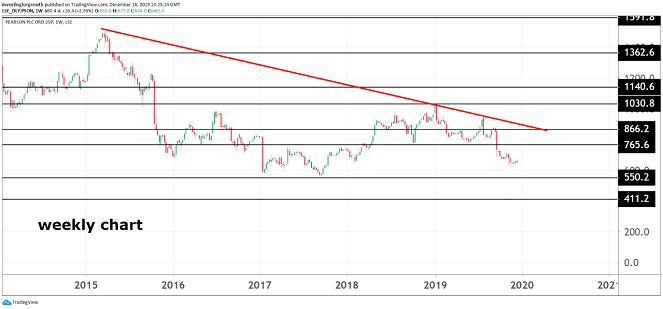Why Pearson shares welcomed CEO’s departure
Shares have been lower for most of John Fallon’s time at the company, but change has excited investors.
18th December 2019 13:46
by Graeme Evans from interactive investor
Shares have been lower for most of John Fallon’s time at the company, but change has excited investors.

Pearson (LSE:PSON) boss John Fallon added his name to the lengthy list of departing FTSE 100 CEOs today, having failed to match the textbook publisher's rip-roaring share price success of 2018.
Fallon's intention to end his seven-year tenure in 2020, in order for Pearson to bring in a leader with a “fresh perspective”, comes less than three months after a profits warning sent shares crashing to their lowest level since a dividend cut in 2017.
The stock surprised many in 2018 by bouncing back to post the fourth-best performance overall in the FTSE 100 index, although across Fallon's reign shares have halved from 1,200p.
They were up as much as 5% to 677.8p today as Pearson also announced the £530 million sale of its remaining 25% stake in Penguin Random House to Bertelsmann — a move that will trigger a £350 million buy back of shares in 2020.

Source: TradingView Past performance is not a guide to future performance
The disposal increases Pearson's focus on its goal of becoming a world-leading digital learning company. Fallon pointed out today that 75% of the business was now growing, but that “major industry wide disruption” was still impacting the US higher education courseware business.
The company said in September it expects the division's revenues to decline by around 10% this year due to fewer college enrolments and as students turn away from print products more rapidly than anticipated.
With adjusted operating profit in 2019 now set to be nearer to £590 million than £640 million, the warning reignited questions about Fallon's future and how much cost savings rather than revenues growth have been the driving force behind Pearson's recent progress. Analysts currently expect organic sales to decline 0.6% this year, and only rise 0.1% in 2020.
Fallon said he will continue to work on the “major transformation” of Pearson while chairman Sidney Taurel looks for a new CEO. In doing so, Pearson joins a number of other FTSE 100 companies in a period of leadership uncertainty.
Dave Lewis is not due to leave Tesco until next summer, while a successor to Alison Cooper has yet to be found at Imperial Brands (LSE:IMB) and Iain Conn is still at Centrica (LSE:CNA) despite his departure being announced in July. He's scheduled to stay at the British Gas owner until its AGM in May.
A period of upheaval in the boardrooms of the UK's top 100 companies has also seen the departure of John Flint at HSBC (LSE:HSBA), replaced on an interim basis by Noel Quinn. Other CEO casualties this year include Gavin Patterson at BT Group (LSE:BT.A), who left in January.
Analysts at Morgan Stanley said the departure of Fallon at Pearson had been “largely anticipated” and that the removal of this uncertainty should be welcomed by markets.
They added that the absence of a further profits warning alongside today's announcement would also be seen as encouraging, with two weeks to the end of the 2019 financial year.
Last month, UBS reiterated its “buy” recommendation but cut its price target to 880p from 900p. They noted that Pearson's digital revenues were growing faster than its peers and that this should help moderate declines in higher education courseware revenues in 2020 and 2021, even if print sales still decline at a rate of 30%.
Full performance can be found on the company or index summary page on the interactive investor website. Simply click on the company's or index name highlighted in the article.
These articles are provided for information purposes only. Occasionally, an opinion about whether to buy or sell a specific investment may be provided by third parties. The content is not intended to be a personal recommendation to buy or sell any financial instrument or product, or to adopt any investment strategy as it is not provided based on an assessment of your investing knowledge and experience, your financial situation or your investment objectives. The value of your investments, and the income derived from them, may go down as well as up. You may not get back all the money that you invest. The investments referred to in this article may not be suitable for all investors, and if in doubt, an investor should seek advice from a qualified investment adviser.
Full performance can be found on the company or index summary page on the interactive investor website. Simply click on the company's or index name highlighted in the article.